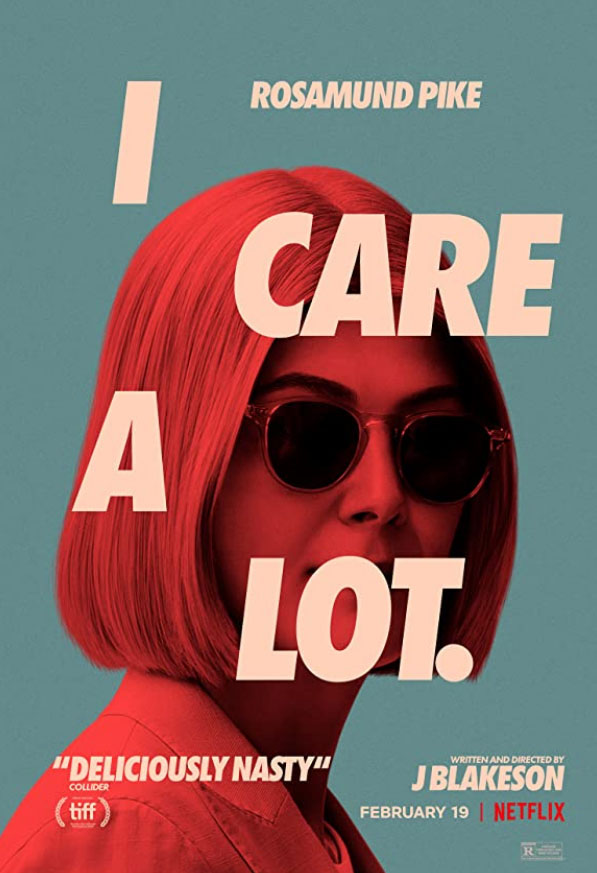
There is a second hour “I Care A Lot” scene in which Marla Grayson, a fearless and persistent individual, is threatened with death. This is not the first such threat, but it is the first that seems immediately actionable. Her response is uncompromising. She offers a whip and a shrug, essentially rejecting the threat of death. Who cares about death? Not Marla. This moment is informative. By this point, the film has drifted through a number of various iterations of itself. He has played around with social satire, petty legal drama, a comedy of morals (none), and something like a nasty social myth. By this point, he’s delving into something of a crime-drama comedy. Admittedly, the diversion up to this point had already strained my credibility but that moment of apathy in the face of death was the moment of complete disengagement. Because, if Marla is so ambivalent about her own fate – why should we care what happens to her?
Marla, played with precision of a bow by Rosamund Pike, is a guardian by profession but a grifter and a fellow artist by spirit. When we meet her in Massachusetts, she is settled on a good grift where she convinces the courts to allow her guardianship for the elderly, after which she places them in care homes and sells their homes and their assets for profit. Little care for the elderly, and few that are easy to deal with.
The latest mark is Jennifer Peterson (Dianne Wiest plays the closest thing to a human figure in the film) – an elderly woman with no family. Jennifer is fine on her own but Marla manages to get to her in quick and easy ways. But the situation gets complicated when Marla discovers some hidden gems in her possession, and things start to disappear when Jennifer’s relationship with members of the Russian mob surface. From there, “I Care A Lot” finds itself at the helm of a particular conflict between forces as different terrible people confront one another.
It does not signify great ingenuity or peculiarity that “I Care A Lot” is filled with contemptible people. At every turn, J Blakeson’s (alleged) comedy emphasizes the ways in which every character we meet is hardly pleasant. Marla is the most aggressive, though, and Blakeson, who writes and directs the film, is enchanted with his wit – presenting the worst of his impulses with delight. Familiarity with terrible people is not unusual for a film, but “I Care A Lot” struggles with establishing where it wants to be. Marla is more of an idea than a full blooded person. It’s a foggy idea of the worst of American greed and capitalism crafted in yellow tits with stiletto heels and the sleekest wardrobe. Rosamund Pike’s work clearly rips off her earlier work in “Gone Girl”, with the exception of the mercurial Amy Dunne was acting to serve something more explicit than Marla here. Pike is good here, but the more “I Care A Lot” goes on the more we see the actors making the most of these widely depicted characters, unsure of what ‘ r the finer point.
And that part cannot be overstated. The cast in this gets the job done. Beyond the Pike Golden-Globe nominated turn, the entire cast is doing dedicated work. The weirdest as the unconscious victim of Marla’s ruse is the show’s best, mainly because she plays Jennifer in a very specific cast that resists the film’s later tendencies to make the film something Very Intense and Important. She also disappears from the screen when the film tirelessly comes out in the final third. Beyond Wiest, Peter Dinklage is reliably enjoyable as a Russian mobster, Isiah Whitlock Jr. is reliably frustrated as one of the worst critics in recent cinema, and Chris Messina is extremely restless in a much too short time as a charming lawyer. Every member of this cast seems to have conveyed the message on which characters they play. What they haven’t got is any clear indication of what the film is working towards.
The film hasn’t grasped that note, either. By the halfway point, and there’s a moment where the film suddenly deviates into another version of itself that you can quite explicitly point out, I found myself wondering what all this good acting in service. Pike does his best to make Marla’s turn from an irresistible villain, to a criminal offender, to an ambitious lesbian to cynical antihero work but at all times “I Care A Lot” fails to establish one key thing. What exactly is he trying to communicate? The less specific, and the bigger, it goes then the more diligent it gets, so by the time the film closes on a giant censure of American capitalism and its greedy fantasies, it’s feels like it should pack a tidy punch, just feels incredibly boring.
The sunny, slick cinematography that has marked so much cinema digitalization over the past few years doesn’t help. “I Care A Lot” often looks too slick overall to register as specific enough to stay in your memory. Sure, these people are terrible. But, so what? Who can really care too much about their particular friends when they are as ambiguous about themselves as they are about each other? Despite all the hate that the characters make, Blakeson still feels unwilling to explore the true specificity of any one person’s horrors and instead kicks it all at some point because America is terrible. Possibly suitable, but ultimately revealing. When it all comes to an end, the characters have long ceased to be human beings and are only placeholders for notions of toxicity, greed and capitalism. The elders whom Marla has overpowered are so forgotten in the film with as much attention as Marla gives them. But who cares anyway? Not this movie.
I Care A Lot is available for streaming on Netflix, and on Prime Video in some territories.
